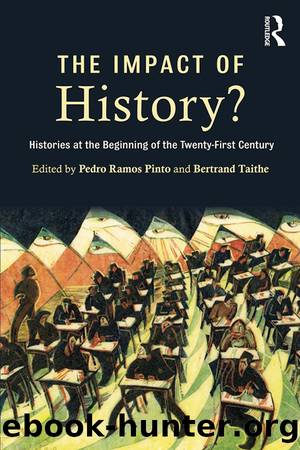The Impact of History? by Pedro Ramos Pinto Bertrand Taithe

Author:Pedro Ramos Pinto, Bertrand Taithe [Pedro Ramos Pinto, Bertrand Taithe]
Language: eng
Format: epub
Tags: History, General, Historiography, Study & Teaching, World
ISBN: 9781317537212
Google: 4McqBwAAQBAJ
Publisher: Routledge
Published: 2015-03-24T01:25:04+00:00
8 âDifferent and better timesâ?
History, progress and inequality
Emily Robinson1
A great deal of recent academic work (my own included) has put forward the idea that we are living in an age of âpresentismâ, cut adrift from the great emancipatory and nationalist narratives of history. Instead, we look to the past not as a guide, but as an open-ended source of inspiration; a dressing-up box where we can find whatever form of historical identity we choose. âPastnessâ here has cultural cachet but no ability to bind or limit us. Rather than making us the end product of a linear narrative of development, this way of using the past allows us to be, in Peter Mandlerâs words, âartists of our own becomingâ.2
This is a compelling account of the uses of the past in an age of what has been called âliquid modernityâ.3 It is fluid, unstructured, malleable. On the one hand, this has radical potential. In 1991 Keith Jenkins expressed the hope that recognizing history âas what it is, a discursive practice that allows present-minded people(s) to go to the past, there to delve around and reorganise it appropriately to their needsâ might create the space for âfresh insightsâ to emerge about aspects of the past âthat have previously been overlooked or sidelinedâ. Jenkins believes this could âactually make emancipatory, material differences to and within the presentâ.4 On the other hand, as Tristram Hunt has argued more recently, it has left us without the necessary frameworks to critique historical and political structures. Hunt is particularly critical of the way in which traditional social history â with its âsocial purpose, analytical relevance and contemporary relevanceâ has been replaced by an individual âquest for identity and empathyâ within a past that has become âan attractive and lucrative media commodityâ.5
The point I would like to make in this chapter is that contemporary uses of the past are not quite as free-floating as they appear. While the grand narratives of both left and right may have broken down, a more fundamental belief in Progress-with-a-capital-P persists and is embedded in many of the ways in which we encounter historical narratives in both daily life and as leisure activity. However, this progress is imagined as something that has already been achieved. It is the means by which we arrived at the present moment â with social discrimination, absolute poverty and the class system seemingly having dissolved along the way. But unlike grand narrative history, it does not point forward to an imagined future destiny. Indeed, as we will see, the idea that progress has gone âtoo farâ is also common. This militates against the radical emancipation looked for by Jenkins.
For instance, and as Hunt points out, an interest in the lived experiences of poverty and inequality is now a part of mainstream popular culture. The ânew heritageâ sites invite us to explore the lives of working people, whether through industrial heritage exhibits or by foregrounding the âbelow stairsâ areas of country houses, while the experiences and hardships of âordinary peopleâ also form the mainstay of âliving historyâ TV.
Download
This site does not store any files on its server. We only index and link to content provided by other sites. Please contact the content providers to delete copyright contents if any and email us, we'll remove relevant links or contents immediately.
The European Opportunity by Felipe Fernández-Armesto(584)
The European History Highway: A Guide to Internet Resources by Dennis A. Trinkle Scott A. Merriman(543)
The Seven Wonders of the Ancient World by Michael Denis Higgins(530)
Morgan Kaufmann Digital Watermarking and Steganography by Ingemar Cox Matthew Miller Jeffrey Bloom Jessica Fridrich Ton(530)
European Security without the Soviet Union by Stuart Croft Phil Williams(513)
Hyperculture by Byung-Chul Han(512)
The Routledge companion to Christian ethics by D. Stephen Long Rebekah L. Miles(510)
European Security in a Global Context by Thierry Tardy(507)
Get Real with Storytime by Julie Dietzel-Glair & Marianne Crandall Follis(445)
Hudud Al-'Alam 'The Regions of the World' - a Persian Geography 372 A.H. (982 AD) by V. V. Minorsky & C. E. Bosworth(440)
Tibetan Studies in Comparative Perspective by Chih-yu Shih Yu-Wen Chen(437)
Gorbachev And His Generals by William C. Green(430)
Governance, Growth and Global Leadership by Espen Moe(428)
CliffsNotes on Fitzgerald's The Great Gatsby by Kate Maurer(415)
How Languages Are Learned 5th Edition by Patsy M Lightbown;Nina Spada; & Nina Spada(410)
The Egyptian Economy, 1952-2000 by Khalid Ikram(389)
The Oxford History of the World by Fernández-Armesto Felipe;(388)
The Oxford Handbook of the Incas by Sonia Alconini(374)
Oral Poetry and Narratives from Central Arabia: The Poetry of Ad-Dindan : A Bedouin Bard in Southern Najd (Studies in Arabic Literature, Vol 17) (English and Arabic Edition) by P. M. Kupershoek P. Marcel Kurpershoek(368)
